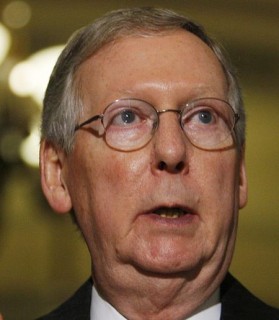
Believe everyone is with Paul Krugman on this one, except for the GOP leadership.
Don’t Cry for Wall Street
By PAUL KRUGMANOn Thursday, President Obama went to Manhattan, where he urged an audience drawn largely from Wall Street to back financial reform. “I believe,” he declared, “that these reforms are, in the end, not only in the best interest of our country, but in the best interest of the financial sector.”
Well, I wish he hadn’t said that — and not just because he really needs, as a political matter, to take a populist stance, to put some public distance between himself and the bankers. The fact is that Mr. Obama should be trying to do what’s right for the country — full stop. If doing so hurts the bankers, that’s O.K.
More than that, reform actually should hurt the bankers. A growing body of analysis suggests that an oversized financial industry is hurting the broader economy. Shrinking that oversized industry won’t make Wall Street happy, but what’s bad for Wall Street would be good for America.
Now, the reforms currently on the table — which I support — might end up being good for the financial industry as well as for the rest of us. But that’s because they only deal with part of the problem: they would make finance safer, but they might not make it smaller.
What’s the matter with finance? Start with the fact that the modern financial industry generates huge profits and paychecks, yet delivers few tangible benefits.
Remember the 1987 movie “Wall Street,” in which Gordon Gekko declared: Greed is good? By today’s standards, Gekko was a piker. In the years leading up to the 2008 crisis, the financial industry accounted for a third of total domestic profits — about twice its share two decades earlier.
These profits were justified, we were told, because the industry was doing great things for the economy. It was channeling capital to productive uses; it was spreading risk; it was enhancing financial stability. None of those were true. Capital was channeled not to job-creating innovators, but into an unsustainable housing bubble; risk was concentrated, not spread; and when the housing bubble burst, the supposedly stable financial system imploded, with the worst global slump since the Great Depression as collateral damage.
So why were bankers raking it in? My take, reflecting the efforts of financial economists to make sense of the catastrophe, is that it was mainly about gambling with other people’s money. The financial industry took big, risky bets with borrowed funds — bets that paid high returns until they went bad — but was able to borrow cheaply because investors didn’t understand how fragile the industry was.
And what about the much-touted benefits of financial innovation? I’m with the economists Andrei Shleifer and Robert Vishny, who argue in a recent paper that a lot of that innovation was about creating the illusion of safety, providing investors with “false substitutes” for old-fashioned assets like bank deposits. Eventually the illusion failed — and the result was a disastrous financial crisis.
In his Thursday speech, by the way, Mr. Obama insisted — twice — that financial reform won’t stifle innovation. Too bad.
And here’s the thing: after taking a big hit in the immediate aftermath of the crisis, financial-industry profits are soaring again. It seems all too likely that the industry will soon go back to playing the same games that got us into this mess in the first place.
So what should be done? As I said, I support the reform proposals of the Obama administration and its Congressional allies. Among other things, it would be a shame to see the antireform campaign by Republican leaders — a campaign marked by breathtaking dishonesty and hypocrisy — succeed.
But these reforms should be only the first step. We also need to cut finance down to size.
ATTENTION READERS
We See The World From All Sides and Want YOU To Be Fully InformedIn fact, intentional disinformation is a disgraceful scourge in media today. So to assuage any possible errant incorrect information posted herein, we strongly encourage you to seek corroboration from other non-VT sources before forming an educated opinion.
About VT - Policies & Disclosures - Comment Policy



